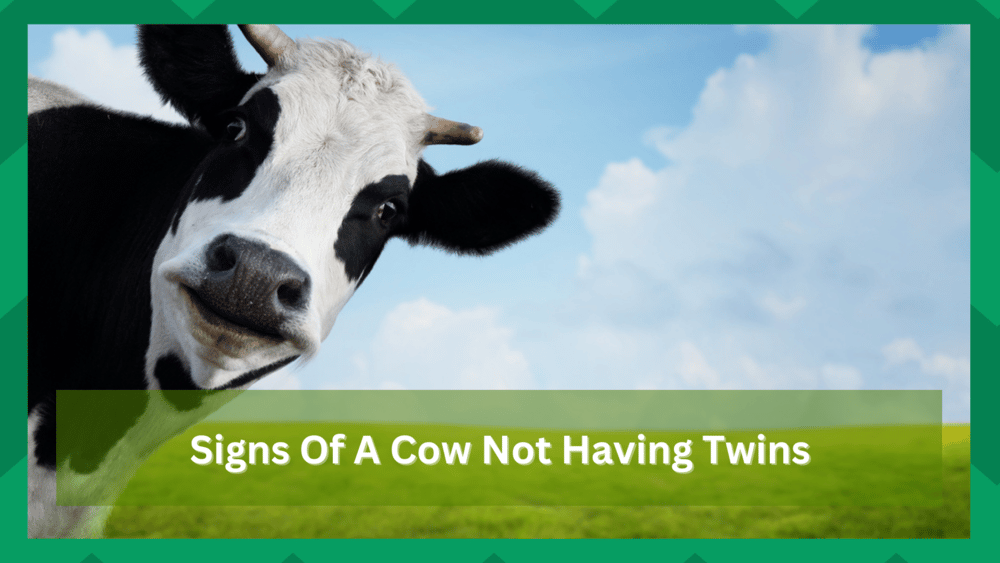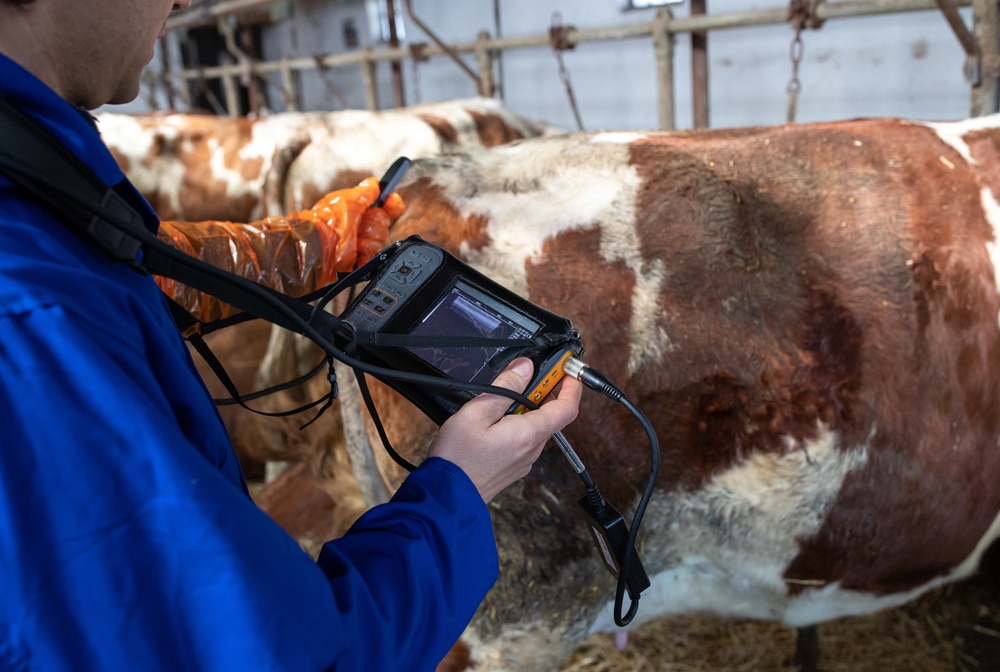
It is common for cows to give birth to one baby at a time. Only in rare cases can cows give birth to twins.
According to evidence published by Kansas State University, only 1 to 2 percent of the breeder cows’ pregnancies lead to twin calves’ birth. There are several reasons behind a cow delivering twins.
The Cows expect twins whenever an embryo splits at a very early stage in the development process.
In addition, it has also been reported that if the cow gives birth to twins once, it should be kept in notice that it can give birth to twins again.
So once your cow has delivered twins, it is highly likely to have twins in the following pregnancies.
Moreover, twins need more attention to survive in vitro than when the cow is pregnant with only one calve.
It is because there is a high chance that either one-baby calf will stay alive or both will die.
In very rare cases, both twins are born, but they have some negative and positive aspects.
Hence you must identify the earliest possible stage if your cow is expecting twins in the next delivery so you can take better care and reduce any risks and harm.
Having said that, if you want to know how you will recognize if your cow is expecting twins, then the guideline below will help you in your case.
Farmers are quite excited when the cow is in the gestation period. They wait to see whether one or two calves will join their family.
As already mentioned, it is not usual to see a cow delivering twins; hence, it makes the breeders excited to know if the cow is expecting twins and what to expect at the end of their gestation period.
During this pregnancy, one should know the signs of the cow having twins so one can prepare for the coming situations accordingly and take better care while paying more attention to the pregnant cow.
Common Signs of a Cow Having Twins
- The Cows Get Pregnant Early
For the cows’ that are expecting twins, it is for sure that they will show pregnancy signs in the early stages compared to the one which will give birth to only one baby calf.
So you have plenty of cows at your farm, and one or two had become pregnant way before you were expecting them to be, then there is a sure chance that your cows are pregnant with twins.
Considering it is very rare, accounting for only around 2% of pregnancies, you should be very careful about the environmental maintenance of their cows and general care.
Moreover, the farmers should take proper care of the cows during this period because if anything happens to the cow, it will affect the twins, resulting in the twin born either weak or with extreme difficulty considering their location in the birth canal.
It is important to keep in the back of your mind that delivering calves twins can even result in the twins’ death.
- Higher Milk Production
Meanwhile, the other sign to know whether the cow is expecting twins is that the cow will give more milk than the one with a single baby calf.
You can predict that your cow will deliver twins if you observe it producing more milk than the usual amount around 14 days before ovulation.
You would be able to appreciate this sign if you are someone who regularly milks their cows. So if you are not milking the cows yourself, you’ll probably miss out on this sign of a cow having twins.
What explains this best is that a greater amount of milk production before the 14th day of estrus usually increases the probability of double ovulation with an even greater chance of getting pregnant with the twins.
- Shorter Gestation
People curious to know about the signs of a cow having twins should know that the cow will have a shorter gestation period than the cow having a single baby calf.
It would help if you gave full attention during this period and a proper diet for the cow is necessary so that the twins stay healthy.
Although this is not one of the significant signs that would help you appreciate if the cow is expecting twins, it is still one sign to consider.
The normal gestation period expected for a cow pregnant with one calf is 283 days; however, with pregnant cows, this can decrease to around 270-274 days.
Nevertheless, it is not a hard and fast rule as the gestation period can also differ depending on the environment, nutrition, and general health of the cow and the calf.
Hence, you should consider other signs to know if the cow is expecting twins or not well before the end of the gestation period.
- Ultrasound
On the other hand, if you cannot identify whether your cow will give birth to a single baby calf or twins by using the techniques mentioned above, then the ultrasound is the alternative way to know it.
It is the most authentic and valid way to identify if your cow is expecting twins.
You should take your cow to the clinic early in gestation. The tests between 45 to 90 days will clearly show if the cow has two embryos, resulting in twin delivery at the end of the gestation.
The test results will let you know the answer to whether your cow will give birth to twins or not.
The presence of two corpora lutea, two visible fetuses with fetal membrane and heart rate, and a twin line visible on ultrasound indicate that your cow is pregnant with twins.
You must identify the twin pregnancy well on time, so you can manage the cow with great care and plan its monitoring during and following pregnancy to avoid any risks and harm to the cow and the baby calf.
- No Clue
Unfortunately, in some cases, you will not find any signs of whether the cow is having twins until the cow gives birth.
This can be risky because if you do not know about it from the beginning, then the twins might die because of negligence.
There are also chances that the second fetus, while growing, has been dominated by the first fetus, resulting in less nutrition and a small awkward location in the birth canal.
This would result in the second fetus being weak and delivered with excessive strain resulting in the compromised health of the cow together with that of the calf.
Being not able to identify well before time if your cow is expecting twins can be fatal for the calves, harmful to the cow, and upsetting and hassle some for you at the end of their gestation.
- Rectal Palpation
Rectal Palpation is the only cheapest way to know whether the cow is expecting twins through the manual method.
Vets can find the signs of a cow having twins through this process.
Besides them, you may find breeders in the market with extensive experience with pregnant cows who have developed skills in the method of Palpation.
In this process, the vets or professionals feel the head of the babies through the cow’s uterus and know whether there is a single head or two.
Doing this gives them the answer to what they are looking for.
Survival Of Twins
Until now, we have gathered enough knowledge about the signs of a cow having twins and how to identify your cow having a twin at the earliest possible stage so you can take better care, provide extra nutrition and monitor them accordingly.
That being said, it is also imperative that you know that the survival rates of the calve twins are significantly low.
It is due to the significantly different placenta sizes of the twins in vitro, where one is not good in size to provide sufficient nutrition, or the baby calf is stuck in the birth canal where extra pressure and difficult labor can result in the death of the weak calf.
Conclusion
As we know, the birth of twins has a low probability, and recognizing whether the cow will give birth to twins is not easy.
However, we do have some methods to check for the signs of twins, which include checking the production of milk. If it is more than the normal pregnancy case, then you should be expecting twins.
Furthermore, if the gestation period is smaller than twins can be expected. The chances of finding the signs of the cow having twins are very low because, in most cases, you can only know about twins after birth.
Therefore, you should take proper care of the pregnant cows and provide them with enough food to give birth to the twins without facing any problems, like premature delivery or dead fetus.
Moreover, you can always consult doctors for further information because they can guide you better.



